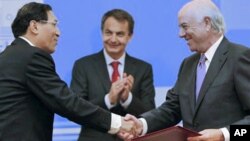Some aid experts and economists say they are not surprised by a report that China lent more development aid in places such as Africa and Latin America over the past two years compared to the Word Bank. They attribute the increase to China’s growing need for scarce resources.
In just a few years, China has gone from being a large aid recipient to one of the largest development aid lenders and donors.
Statistics compiled by the Financial Times newspaper showed that in 2009 and 2010, the China Development Bank and China Export-Import Bank agreed on a total of $110 billion in loans to governments and companies in developing countries.
That exceeds the record $100 billion given out by various arms of the World Bank during roughly the same time period, in response to the global financial crisis.
The Chinese agreements included large loan-for-oil deals with Brazil, Russia and Venezuela, as well as infrastructure projects in Argentina, Belarus, Ghana and Mozambique.
"Some of these loans help develop access to natural resources and mineral mining, oil and power sources, and even, in some cases, agricultural land and production possibilities, all of which China desperately needs because it is a resource-scarce country," states Yukon Huang, a former World Bank country director for China..
Huang is now with the Carnegie Endowment for International Peace research organization in Washington. He says China is increasingly using its formidable financial assets to further its own interests - such as expanding its exports and promoting the internationalization of the Chinese currency, since some of the loans are partially denominated in Yuan.
But, he says, that is not unusual.
"Japanese loans support Japanese objectives, U.S. loans support U.S. objectives. These loans support Chinese objectives," he said.
Shen Jianguang, chief economist with Mizuho Securities Asia, says China’s economic power has grown and the country has entered what he describes as "a new stage" in which it can comfortably expand its presence abroad.
“I think what China is doing today is no different to other advanced economies, what they’ve been doing all the time abroad - so all the development aid to other developing economies also involves some soft power,” Shen said. “So I think they [China] are just following this common practice."
The Financial Times says the two Chinese banks provide better terms than the World Bank and other lenders, especially for deals that Beijing strongly supports. The Chinese loans also tend to come with less onerous transparency conditions.
At a recent briefing, Foreign Ministry spokesman Hong Lei was asked if China is trying to compete with the World Bank. He did not directly answer the question, but said China will continue providing development aid to other countries.
Hong says as China continues to develop, it will continue to provide development aid to other countries as - in his words - a concrete reflection of China’s contributions to world peace.
China’s aid efforts, however, have been criticized by rights and development agencies and other organizations around the world. Some rights activists say that China’s aid and trade deals, particularly in Africa, help prop up unsavory governments, and that little of it benefits average people. Some development experts have said that Chinese loans and grants often are not tracked to prevent corruption or do little to reduce poverty.
The World Bank declined to be interviewed for this report, but sent a written statement saying that it is working more closely than ever with China,” with which it enjoys “an important and growing partnership.




